The covid-19 pandemic shattered the travel industry which is still recovering today. But many airline stocks have doubled since their 52-week lows, do they have more runway ahead or will they crash and burn?
If you are considering booking travel or signing up for a new credit card please click here. Both support LiveAndLetsFly.com.
If you haven’t followed us on Facebook or Instagram, add us today.
Financial Disclosure: Anyone who invests in a diversified retirement account likely owns some travel stocks, airlines included. I am not a financial advisor, readers should conduct their own research or contact a financial advisor before making any financial decisions. I currently invest in a diversified account that features travel stocks and I separately own a small number of shares of American Airlines stock (AAL) and Spirit Airlines stock (SAVE.)
March Was The Bottom for Airline Stocks
Virtually all equities (stocks) suffered in March (and throughout the spring) dropping off a cliff as the coronavirus crisis set in and the economy began shutting down. Even obvious pandemic choices like Peloton when all the gyms are closed – I had my finger on the button at $18/share – was down 50% from its 2020 high. Today that stock is trading above $150/share.
But travel stocks, my oh my were they battered. I haven’t included all airlines on the market in the below gallery, just the ones I paid the most attention to this year.
Airlines in the US had one of their best years in 2019 and 2020 was off to a hot start. But that, as we know, did not last. It got really, really dark. Spirit Airline’s stock was down more than 85% in just a couple of weeks. United Airlines Holdings Company (Nasdaq: UAL) was down 80%, American Airlines Group (Nasdaq: AAL) nearly 75%.
It didn’t matter whether they were traded on the S&P 500, Nasdaq, or NYSE, flag carrier or discounter, everything was down considerably and for good reason. Business travel, the lifeblood of airlines, came to a grinding halt, air passenger volumes dropped to next to nothing. And it was for good reason, too little was known about the virus, how to treat it and just how dangerous it was.
Other than a brief return in May, March appears to be the worst of it for passenger airlines.
Airline Stocks Have Doubled, Well Most
All stocks have come a long way from where they were, some stocks could be argued as irrationally high right now. Airlines have performed well amongst publicly traded companies, in part, because they had so much ground to regain.
Every airline stock I listed has doubled with the exception of American Airlines which recently backed off higher numbers. It’s not surprising to me that American has continued to struggle more than most, given the extent to which the business has been leveraged and frankly, the c-suite.
Southwest Airlines is just over twice its 52-week low but didn’t fall as far Delta Air Lines, for example. But some have absolutely crushed it. For example, Spirit is up 367% and Allegiant is up 310%.
| Airline | 52-Week High | 52-Week Low | Current Price | From Low | From High |
|---|---|---|---|---|---|
| American Airlines (AAL) | 30.78 | 8.25 | 15.76 | 1.91 | 0.48 |
| Alaska Airlines (ALK) | 67.48 | 20.02 | 53.65 | 2.67 | 0.20 |
| Allegiant Travel (ALGT) | 197.12 | 60.06 | 185.9 | 3.09 | 0.05 |
| Delta Air Lines (DAL) | 62.48 | 17.51 | 39.98 | 2.28 | 0.36 |
| JetBlube (JBLU) | 21.65 | 6.61 | 14.93 | 2.25 | 0.31 |
| Southwest (LUV) | 58.83 | 22.46 | 46.66 | 2.07 | 0.20 |
| Spirit Airlines (SAVE) | 47.5 | 7.01 | 25.73 | 3.67 | 0.45 |
| United Airlines (UAL) | 90.1 | 17.8 | 43.89 | 2.46 | 0.51 |
What Could Take Them Higher
There are a few great things that airlines could have going for them. Revenue passenger miles, a guidance equation that major airlines use to display passenger traffic, fell nearly three quarters from 2019. That sounds bad, but it’s unlikely to fall any further. In the last three months, passenger and cargo traffic has improved but there’s more that could help the air transportation sector.
With the rollout of the vaccine and the fact that nearly 23.5 million people have had the virus and almost assuredly have the antibodies, more people will be traveling in 2021. But the airlines didn’t take the same hit that main street businesses did with the bailout funds many received.
Older aircraft were more likely to require maintenance, satisfy fewer customers, and were less fuel-efficient. Nearly all of those have been sent to the airplane graveyards, even the ones that were recently overhauled.
Travel agents have commented that ticket prices look to be higher for 2021 than pre-pandemic years in a noticeable way. But that’s likely due to reduced schedule/capacity and pent-up demand.
Florida
Some have looked at the changing landscape. The increase in Florida flights from a point-to-point perspective by network carriers raises the question of why some carriers are doing so well while others continue to struggle.
For example, extreme discounters, Allegiant Travel and Spirit both have substantial operations across the sunshine state and are both more than 300% off their 52-week low. However, Allegiant is nearly back to its 52-week high while Spirit still has lots of runway to achieve the same goal. Southwest has been a Florida mainstay for years, and they (pretend to) operate in the discount space.
But JetBlue has a hub in Fort Lauderdale. American Airlines hubs nearly its entire Latin American network out of Miami offering flights to everywhere. So Florida alone can’t be the answer for ALGT/SAVE success while the others trail behind, and it also can’t be the sole reason why some will succeed going forward.
Conclusion
Perhaps Allegiant is showing the way for other US airlines to return and exceed previous stock performance levels. Its management was excited during earnings calls with an interesting peek into the future in June. I fear that Allegiant has potentially hit its practical limit for the near future, though management is strong. Spirit is building an airline for long term success with the low fares of a company like Ryanair Holding PLC, but a revamped loyalty program that’s innovative and sharp. Still, the greenest opportunity in my eyes has to be JetBlue given their network, new partnership with American Airlines, and upcoming London service.
What do you think? Do airline stocks have more runway? Are they overvalued given the challenges that remain in place? Which one do you like and which stock do you hate?

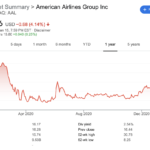
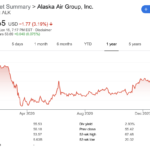
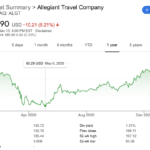
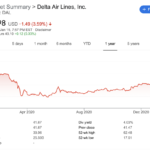
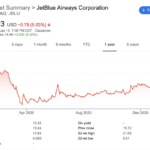
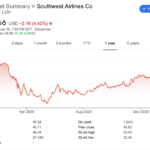
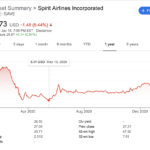
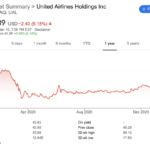


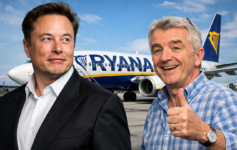
Kyle: unless the world would end with this virus one didn’t need to be a genius to know that airlines would not die. Thus, anyone with cash in hand and some vision would have made tons of money investing in airline stocks during the pandemic. However as you may know, it is not easy to predict the market. Now it is very easy to say “if I bought airline stock in March I would have doubled my investment” but at that time nobody knew if March was the bottom or if the stocks would sink even more. The biggest question that remains is at what level will airlines get back once the pandemic is over. I doubt it will ever be at the levels they were right before the pandemic. If you look at that time, not only leisure passengers were flying all over the place but business travel was at its peak. It was extremely rare to see anyone using video conference tools for day to day work. Yes, some corporations had some fancy tools for international meetings when needed but not even close to what it is today.
The pandemic changed forever the way companies do business. Of course business travel will come back but not even close to what used to be. Why? Because corporations all over the world were forced to try a new way of doing business and for many it worked. I talk to several friends that used to travel non stop for business (including myself) and I ask: “How many business trips and business conferences you attended that looking back today were useless and totally unnecessary?” The answer: Most of them. I spoke with people in the investment banking industry, people that never asked the price of a business class ticket because they knew customers would pay for it. One lady told me used to fly between London and NYC sometimes 3 times per week in business class just to meet clients for 1 hour and turn back. Those times are over. A good friend of mine happens to work for one of the largest business travel companies in the world. Their forecast for the future is not nice. Now, for leisure passengers, there will be a boom since everyone wants to get out of their houses but that will then settle down since families have to work, kids have to go to school, etc…
Thus, although I think there is more runway for airline stocks to grow, their businesses will never be the same. It will be a different airline industry, smaller, more nimble and with space for consolidations. Forget those dozens of flights from point A to point B everyday, there will be way less options to fly which will probably give the false impression that flights are full but at the end it will be less people flying in less flights.
Excellent points Santastico! I totally agree with what you wrote.
Getting back the leisure travel will not be an issue, in fact for 2-3 years I expect there to be explosive record demand, and airlines gouging the public for every dollar they can squeeze out of them. But the market for high priced business class airfare may never return to the volume of the past. Hopefully, the airlines will reduce the cost of business class so that it can be more affordable for more leisure travelers to get.
@Santastico – As always, thanks for being a faithful reader and thoughtful commenter.
To say that “unless the world would end with this virus one didn’t need to be a genius to know that airlines would not die” is a bit of a simplification. Airlines go out of business with far lower challenges because the business is hard and the margins are small. The world didn’t end after 9/11 but that didn’t save TWA from going out of business. If the initial mortality rates seen in March (11% in Italy, for example) held true (we are all grateful they did not) there’d be more than 2 million Americans dead and more than 8 million worldwide. So to suggest in March that it was obvious the airlines would be saved and ultimately recover is probably inaccurate as well.
“The biggest question that remains is at what level will airlines get back once the pandemic is over. I doubt it will ever be at the levels they were right before the pandemic. If you look at that time, not only leisure passengers were flying all over the place but business travel was at its peak.” I agree and that’s the point of the post.
With ALGT just 6% from its all-time high, is there still room left for growth as the traveling public begins to return? It seems overpriced given what the market is today. Whereas, I am not sure how much higher American can go, fundamentally, because of how leveraged the business is.
@Kyle: my comment about airlines would not die was very general. What I meant was that people would fly again worldwide. Yes, you are correct that some airlines could have disappeared but my comment was more in general and I find very difficult that one of the top US airlines would disappear. BTW, the Government did not shut down the airlines like other business (restaurants were forced to close but airplanes were always flying) so it was about passengers deciding not to fly. I have friends that even with the pandemic they flew enough to make DM with Delta. And no, they never got Covid. Remember Thanksgiving week this year? More people flying than previous years. Problem is really business that are afraid of allowing employees to fly and being sued if they get Covid.
Very valid points. One addition to what youve written. Namely that international travel is also subjected to the various lists of countries where people are allowed to fly to or not. With differing vaccine roll out rates, I dont think those no fly lists are gonna go anywhere till June or July, hopefully just in time for summer peak seasons flying for western europe and the usa.
The black swan in all this is the substantial anti vaxx contingent who will probably refuse to take this vaccine.
Let’s see if the new administration has the balls to impose serious restrictions on the anti vaxx people. I doubt it but we will see. In my state if kids don’t take vaccines they cannot attend school or play sports in a league. I hope once Covid vaccine is available to everyone they add Covid vaccine to the list. Countries can easily do that as it happens with yellow fever where if you have a passport from a country where there is yellow fever unless you show prove of vaccine you cannot enter many countries.
It comes as no surprise that a travel blogger discussing airline stocks would completely ignore the fundamentals and only focus on the price action and news headlines. We’re talking about over-leveraged businesses in a capital intensive industry that are notorious for underperforming because they can barely service their debt, much less eke out any meaningful profit. But sure, JetBlue shuffling up their route network is what takes them to the moon.
“I am not a financial advisor” – ya you’re right. You certainly ain’t that.
@David – It’s as if you didn’t even read this line, “It’s not surprising to me that American has continued to struggle more than most, given the extent to which the business has been leveraged and frankly, the c-suite.” nor acknowledge the principle of the piece which is in agreement with your theory. These stocks have performed well since the bottom, but without a significant recovery to this point, should they have doubled, and how much “runway” could be left as some of these stocks approach their all-time highs.
Most of the members of Congress now invest in stocks. No wonder they are so quick and generous in bailing out failing and overleveraged busineses. Talk about a conflict of interests.
A true capitalist society wouldn’t bail out businesses having temporary cashflow problems. But we aren’t a capitalist society. We all pretend to be living in one. Creative destruction of capital is a hallmark of capitalist societies but ever since the fed became hyper interventionist under Bernanke we have not been capitalist society
Here is my demand:
1) make it illegal for congress people and their immediate family to invest in stocks. Etfs and mutual funds with at least 10,000 clients are ok.
2) stop feds being interventionist. Give them the original mandate of being lender of last resort in case of a bank run and nothing more. Since Bernanke all fed chairman have run the fed more as a hedge fund than a bank.